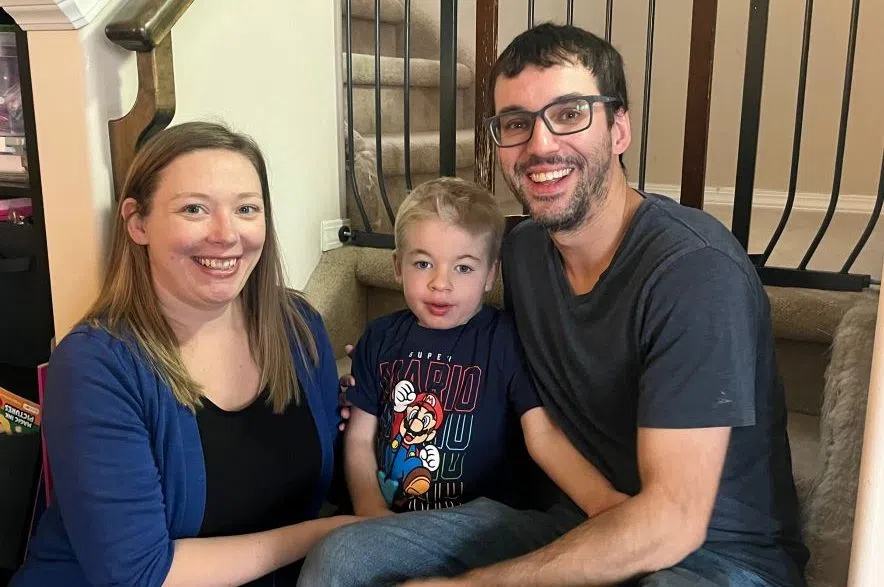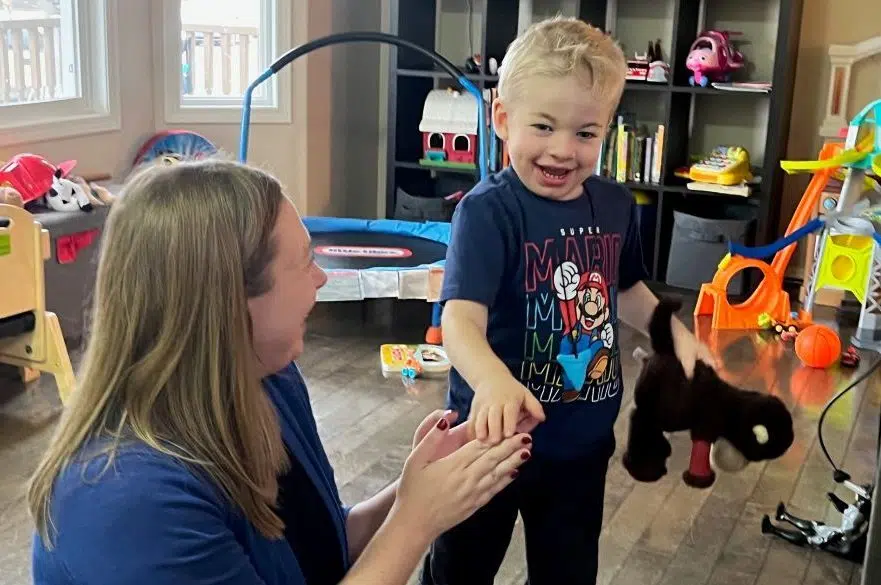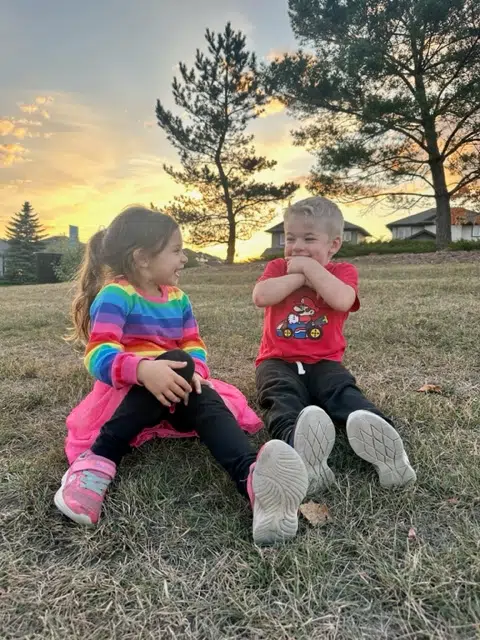To four-year-old Emmett Doucette, everyone is a friend.
As his father Andre Doucette opens the front door to his family’s home, Emmett squeezes past his dad, takes my hand and places it in his father’s hand.
“Da!” he says as he laughs and claps his hands together.
Emmett wants me to meet his father and become friends. While we greet one another and smile, he takes my other other hand, and places it into his mother’s hand, squealing with joy.
“Mum!” he says with a smile.
We shake hands, and satisfied that we’re now friends, Emmett sees his miniature basketball set, so it’s time for everyone to shoot some hoops. Friday is his day off from pre-kindergarten, so he spends much of the day with his mom and dad, while his nearly six-year-old sister Sophie is in school.
“He doesn’t care who anyone is,” says his mom, Steph McCabe. “He’ll go up to anyone … and just grab their hands and want to include them.”
Emmett has the typical energy of a four-year-old, running from room to room, showing off pictures of his beloved uncle and his cat Hubert, bouncing on a miniature trampoline, and even singing one of his favourite songs, “Old McDonald Had a Farm,” with his stuffed cow.
It was just before Thanksgiving that his parents received confirmation that Emmett has an extremely rare and fatal condition called Mucopolysaccharidosis III (MPS), or Sanfilippo Syndrome. It’s a rare and fatal genetic metabolic disorder for which there is no specific treatment, and no cure. It’s also sometimes referred to as childhood dementia.
It’s so rare that there is only one other child in Saskatchewan with a similar type of disease.
“He was about two years old and we noticed his speech delayed, so we started speech therapy,” says McCabe.
“He was six months (old) when COVID hit, so we just attributed it to him being a COVID baby and not having the socialization that normally would have occurred.”
But soon, McCabe said their family doctor thought Emmett might have autism, and tests were completed. Then, a pediatrician noticed what they called “markers” for MPS, and genetic testing was initiated at the time.
Rather than wait for test results to come back months later in Saskatchewan, the family opted for private testing in the U.S. that was done at no charge.
“The results came back in 10 days showing he had two deficient genes,” McCabe says.
McCabe and Andre Doucette were then tested for the deficient genes and both were carriers. Their daughter does not have the recessive genetic condition.
Doucette says they’ve learned there are three phases to the disease: Speech delays and developmental delays, a period of decline during which Emmett could experience seizures and other movement disorders, and then finally what he said doctors called a “life-limiting phase.”
“Typically, it’s a 10- to 15-year window. There’s lots of research going on right now, but currently nothing to show that it’s effective in treating (MPS),” he says.
Listen to Behind the Headlines
Doucette and McCabe don’t have any family in Saskatchewan. While Emmett remains in the first phase, they’ve decided to visit family in Nova Scotia and Ontario, and will try and make their family time as meaningful as possible.
“So far, he’s a typical four-year-old,” Doucette says.
A GoFundMe page has been set up to help accomplish that, and to help with future medical expenses for Emmett. So far, it’s raised around $27,000 of a $40,000 goal.
“We don’t really know what’s coming. So we’ll have additional therapies. We don’t know, for example, if we’ll need wheelchair ramps for the house eventually,” says McCabe.
For now, she says her family is simply a typical family of four.
“We play a lot of cars. (We) go outside when we can. He loves running around outside,” she says. “We take my daughter to school every morning and he plays on the playground with the other kids while they’re waiting to go to school.”
Both Doucette and McCabe say they’re trying to keep things as normal as possible for both of their children.
“Emmett is not his diagnosis,” McCabe says.
They take one day at a time; some days are more difficult than others. But it puts into perspective what’s important in their lives.
“If there’s any lesson in this whole thing is that just to love. Obviously, live every day. Be kind,” says McCabe.









